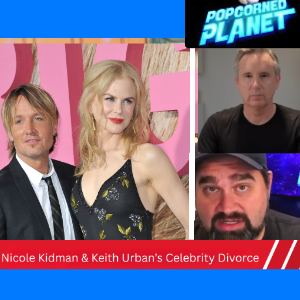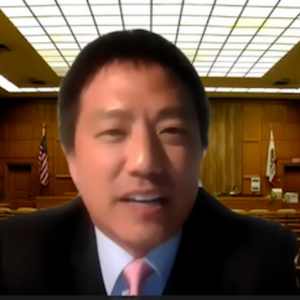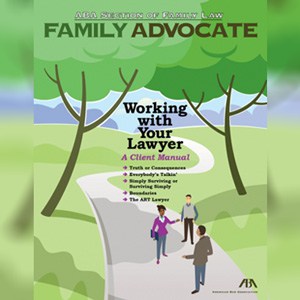
[Source: FM Kawaguchi]
International family law attorney Steven K. Yoda, who is also ranked as a top family law attorney, explains divorce in California and the California divorce system on FM Kawaguchi in Japan.
Interviewer/Interpreter:
Today our guest speaker is Mr. Stephen. K. Yoda, a top family attorney in California, the United States, specializing in family law. Steve and I are members of the International Academy of Family Lawyers, IAFL, an organization of international family lawyers, and I know Steve through the activities through the IAFL. Steve is a third generation Japanese-American, and currently resides in the Los Angeles area of California. He’s attending our FM program during his trip to Japan. Thank you very much for your time, Steve.
So please tell us about your roots and background, first. We ask you to speak about family law later. Steve is speaking English with some Japanese and I will translate what he says in English into Japanese.
Steven Yoda’s Family History
Steven Yoda:
So my grandparents immigrated to the United States from Japan around the 1920s. The Yoda family is originally from Nagano-ken, in what is now the city of Ueda. They immigrated to San Francisco, California where my grandfather was the general manager of multiple stores in the city that sold fine goods from Japan like silks, kimono, art, jewelry, furniture, and the like. The company at that time was called Magariyo and The Company and originally started by other members of the family from another branch known as Magariyo. Eventually, and unfortunately, war broke out between Japan and the United States, and most of my family returned to Japan. My grandfather and grandmother, who by then had two children, my father and my aunt stayed behind to keep an eye on the business. They couldn’t foresee what would happen. As we all know, all Japanese-Americans on the west coast of the United States, including my own family, were rounded up and incarcerated into concentration camps.
My family was eventually sent to a concentration camp in the central desert of Utah where they remained for the duration of the war. When the war ended, my grandfather moved to Salt Lake City, the nearest big city in Utah where they stayed for a few years. There were rumors that the political climate on the west coast was still hostile to Japanese people. Eventually, the family moved from Salt Lake City to the Los Angeles area and that’s how I ended up in Los Angeles. I grew up in a suburb of LA called Torrance. And when I was growing up, the of Torrance was the home to the North American headquarters of many Japanese companies like Toyota, Honda, Nissan and Yonex.
Interviewer/Interpreter:
We have heard stories of the hardships Japanese Americans endured in the incarceration camps. We can only imagine the hardships of your grandparents and your father. How many times have you visited Japan? What is your impression of Japan this time?
Steven Yoda:
So this is my fourth visit to Japan. I first visited Japan in around 2001 with some friends. My second visit to Japan was around 2006, 2007 with my wife. My third visit to Japan was around 2009, 2010, and that was for work. I had some business meetings with a client and so it’s been quite a while since I’ve been to Japan. This time, I’ve come with my children who are 14 years old. I have twin daughters and this is their first trip to Japan. I love visiting Japan. I have a great time every time I visit. This particular trip is very special because even though I’ve seen many of the sites before, it’s like I’m experiencing again for the first time through the eyes of my children.
Steven Yoda’s Educational Background
Interviewer/Interpreter:
Please tell us a little bit about your educational background.
Steven Yoda:
So after graduating from high school in Torrance, I attended Stanford University, which is in Northern California and graduated from there in 1999. I was a history major and after graduation I stayed at Stanford for one additional year and got a master’s degree also in history.
Interviewer/Interpreter:
What kind of history did you study?
Steven Yoda:
So I studied a lot of Japanese and Japanese-American history. On the Japanese history side, I studied under the late professor Peter Deuce, who was an expert on early modern Japan from the Meiji restoration all the way through World War II. In particular, he was an expert on Japanese imperialism, so I covered a lot of that material during my studies at Stanford. On the Japanese-American history side, I wrote an honors thesis that highlighted tensions within the Japanese-American community during the incarceration period. I wrote a biography of sorts on a Japanese-American journalist, his name was James Omura. He was an outspoken critic of the mass incarceration and he was also a critic of Japanese-American leaders at that time who went along with incarceration.
Interviewer/Interpreter:
I remember enjoying talking with you about Japanese history during the IAFL meetings before. What did you do after Stanford?
Steven Yoda’s Professional Background
Steven Yoda:
So after Stanford I worked for one year as a patent litigation paralegal in Silicon Valley, and then after that I attended law school at UC Berkeley.
Interviewer/Interpreter:
What did you do after law school?
Steven Yoda:
After law school, I clerked for one year for a federal judge. It was a great experience for me. For one year I got to read probably hundreds, if not thousands of various court filings prepared by attorneys, and help make decisions for the court. I learned a lot and I take a lot of those lessons that I learned during my clerkship with me to this day.
Interviewer/Interpreter:
What kind of work have you done since becoming a lawyer?
Steven Yoda:
After my clerkship, I worked as a commercial business litigator for 10 years. I also did a little bit of white collar criminal work, criminal defense work too. I worked a little bit in San Francisco and then returned home to Los Angeles. I did a variety of business litigation ranging from intellectual property to real estate to insurance to employment and then about 10 years ago I switched over to family law.
Now, I represent mainly wealthy clients in their family law disputes mostly divorce cases, which include asset and property divisions, spousal support (alimony), child support, and child custody disputes. Over time, just naturally, I’ve come to represent many international clients or clients with international assets and family law issues, and so I’ve organically developed a bit of a subspecialty in dealing with international cases.
California Divorce Process
Interviewer/Interpreter: How is the divorce procedure conducted in California?
Steven Yoda:
The California divorce process generally works as follows, one party, the petitioner files a petition with the court to start the case, then the other party, the respondent, files a response to the petition. After that, the petitioner does his or her financial disclosures and then the respondent does his or financial disclosures. And at that point the case is ready to be settled. If things are friendly, you try to negotiate a settlement, but if that fails then you have no choice and you have to continue with litigation.
Interviewer/Interpreter:
In Japan, as a general rule, the matrimonial property of a couple is divided 50/50 at the time of divorce. In the U.S., I heard that the law differs from state to state. In California, how is matrimonial property divided in a divorce?
Steven Yoda:
So that’s a very important point. Yes, in the United States family law is a state law, not a federal law, and the United States has 50 different states, so there are 50 different family laws governed by each of the different 50 states. California follows what’s known as the community property system, that generally means that assets earned during marriage are automatically divided 50/50.
However, assets from before the marriage or inheritances, even if they’re received during the marriage, are generally treated as 100% belonging to the person who earned it. By contrast, other states follow the equitable distribution system. In many of those states, 50/50 is not automatic. For example, in Connecticut, which is an equitable distribution state, I understand that even pre-marital assets or inheritances can be divided as part of a divorce and the division does not have to be 50/50. That could not be a result in California.
Interviewer/Interpreter:
It is very interesting to hear. In Japan what parent is designated as the parent who holds parent authority in the event of divorce, however, the civil court has recently been amended. After the amended civil court comes into effect, the parties will be able to choose between sole or joint parent authority in the event of divorce. In California, how are custody arrangements made during a divorce?
Steven Yoda:
In California, courts try very hard to award joint custody to both parents. This usually translates to a 50/50 timeshare of the children or somewhere very close to 50/50. There are, of course, exceptions to this rule. If for example, there is terrible domestic violence in the family, then a California judge might award sole custody to one parent. However, all things being equal, if parents are both decent people, custody will probably be close to 50/50 timeshare. This is because California law dictates that judges, when deciding custody, must try to promote “frequent and continuing contact with both parents.”
Interviewer/Interpreter:
Interesting. Now, we are going to ask Steve about his work. What is the most rewarding and exciting aspect of your job?
Steven Yoda:
I love representing human being clients. Remember when I was talking about my background a little while ago, when I started my legal career, I started as a business litigator. I often represented clients who are corporations, corporate clients, but in family law I represent human being clients. My clients are going through very difficult times in their personal lives and they’re entrusting me with some of the most sensitive information in their lives, their finances, their children, the private dynamics of their home. It is very rewarding to help these clients extricate themselves from a difficult time, close this chapter of their lives and help them move on to the next chapters of their lives.
Interviewer/Interpreter:
What do you find difficult about your work? How do you overcome them?
California Law & Unpredictable Outcomes
Steven Yoda:
For me, the most difficult aspect of work is the uncertainty of the legal process and the law. As a lawyer, I would love to be able to provide clear, predictable answers to my client’s questions. How much financial support will I receive? How much custodial time will the judge give to me? Unfortunately, it is often difficult to predict these answers. California law gives judges very broad discretion to decide these kinds of issues. Some judges may lean one way, other judges may lean another way. Sometimes the same judge may lean one way or the other depending on the facts of the case. So while you might be able to develop an idea of the range of possible outcomes, it is almost impossible to predict a specific outcome in a specific case. So to help overcome this, I try to speak very clearly and even bluntly to my clients. I try to be crystal clear about the uncertainty that they face. We could win, we could lose, we could end up somewhere in between, no one knows. When a case begins, not even the judge knows which way the case will go.
I try to be very upfront about this with my clients. I often tell my clients that litigation is a form of gambling. I know that clients crave certainty, they’re looking for answers, but I cannot foresee the future, no one can. So I try to force my clients to face this reality. I know it’s unpleasant, but it’s also empowering in another way when you think about it. Once clients begin to understand that there is no one right answer or no guaranteed answer, they also begin to understand that every decision and every strategy they decide to take has risk. They have to make the best decision that they can with the information that is available to them and accept the consequences good or bad. So I try to manage uncertainty by being brutally upfront about it.
Interviewer/Interpreter:
But I think Steve, you could say that because you are very experienced. I really agree with you that the outcome is unforeseeable. I personally think that we need to think of ways to achieve better solutions even though the outcome is unforeseeable. Next, please let us know what is the first piece of advice you would give to people going through divorce in California?
Advice for Divorce in California
Steven Yoda:
That’s very easy, my advice would be try your best to get along with your ex. Keep things as friendly and amicable as possible, especially if there are children involved. The marriage may not have worked out between you and your ex, but that does not mean that you and your ex need to hate each other or battle to the death. When parties get along with each other and treat each other fairly, cases can settle more quickly and peacefully. Parties can also move on with their lives. When cases drag out and there is incessant fighting, everyone becomes miserable. The only people who win in that case are us, the lawyers, and every dollar that the lawyer takes is one less dollar that will go to the family.
I would rather you give an extra dollar to your ex to settle the case quickly than give me the extra dollar to fight. Even if you feel that you are paying a little bit more than you would like to, to your ex, remember that the cost of litigation will probably be even greater than that. Of course, if your ex is unreasonable, then you may have no other choice but to fight in court. But my advice would be try your best to get along with your ex.
Interviewer/Interpreter:
You are a very good lawyer. I really think.
Steven Yoda:
Thank you.
Interviewer/Interpreter:
You say that it is important to resolve the issue quickly and amicably. I agree with you wholeheartedly. I’m going to ask Ori-san about the impression of the interview today.
Well, in Japan and at school we learn from the Jomon the ancient, ancient history to the Meiji era and probably in general probably we don’t learn so much about modern history after the Meiji era. But she wonders if many people in the U.S. study Japanese history after the Meiji era, as you studied the imperialism or the World War II that time of the history very much.
Steven Yoda:
Very rare, very rare. For example, I think in my department at Stanford in the history department, when I graduated, maybe of the entire history department, I can recall maybe only three or four students who were interested in modern Japanese history in my class.
Interviewer/Interpreter:
Out of a whole history period you mean?
Steven Yoda:
In my class, in the history department at Stanford, my graduating class, maybe three or four students, including myself, who were interested in modern Japanese history.
Interviewer/Interpreter:
How many students were there in the history class?
Steven Yoda:
Ooh, that’s a good question. I’m going to guess, I don’t know offhand, but if I had to make a guess, I think it was probably under a hundred, maybe closer to fifty-ish would be my best estimate.
Interviewer/Interpreter:
Yeah, just I think the modern history is also very important. It’s good to be interested in the modern history of Japan as well.
Steven Yoda:
I thought it was very interesting period to learn.
Divorce in Connecticut
Interviewer/Interpreter:
In Connecticut, you said when the couple divorces, they divide the property which they actually gained before marriage.
Steven Yoda:
It can happen, yes.
Interviewer/Interpreter:
They divide it, but what happens if a couple divorces right after they got married or what happens to the couple who divorces after 20 years of marriage? Is there any difference between these two cases?
Steven Yoda:
Okay. I’m not a Connecticut lawyer, so I technically cannot give an official answer under Connecticut law, but let me try to answer it in California and give you my understanding of Connecticut law. So in California, if a couple were to marry right away and then divorce right away, there would be very little community property because the marriage was so short, there was not enough time to amass enough property to divide. By contrast, if the marriage is very, very long, the couple would probably have collected more property over the course of the marriage, so there would be more property to divide. There’s a separate issue from property in California, which is spousal support. Spousal support is on top of or in addition to property division.
A California judge would consider the length of marriage to determine how long the high earner should pay the low earner. Again, if the marriage was very, very short, the high earner would probably pay spousal support to the low earner for a short time. If the marriage was very long, then the higher earner would pay the low earner for a longer time. I’ll stop there so you can explain that and then I’ll get to my understanding of Connecticut.
Interviewer/Interpreter:
Time is limited, but would you explain very briefly about the Connecticut?
Steven Yoda:
So in Connecticut, my understanding is Connecticut does not necessarily take this rigid approach to property first and then spousal support second. My understanding is that the analysis is all kind of mixed, so the Connecticut judge could consider the length of the marriage and how long the marriage was, who the high earner is, who the low earner is, who contributed to the household to determine how to divide the property.
Interviewer/Interpreter:
Thank you, Steve. Could you give a message to Japanese audience?
Steven Yoda:
Yeah, to the Japanese audience that is listening today, thank you very much. I’m surprised that anyone would even care to listen to what this lowly Japanese-American family lawyer from Los Angeles has to say. But I’m a proud American, but I’m also very proud of my Japanese heritage. Japan’s global reputation for quality, craftsmanship, hospitality, courtesy, cleanliness, technology, and tradition is something that inures to the benefit of all ethnic Japanese everywhere. So please keep up the good work.
Interviewer/Interpreter:
Hi. Steve, thank you very much for joining us on the FM Program today.
©2024 FM Kawaguchi. No claims made to copyrighted material. Aired 6/25/24.
5 More posts from Steven K. Yoda on Divorce in California
More on High Net Worth Divorce

Nicole Kidman & Keith Urban’s Celebrity Divorce Explained





